AI & the Future of Accounting
VerifiedAdded on 2020/05/16
|9
|3668
|61
AI Summary
This assignment delves into the impact of artificial intelligence (AI) on the accounting industry. It argues that instead of replacing accountants, AI acts as a powerful tool, enhancing efficiency and value through recommendations. The document analyzes historical changes in accounting practices brought about by technology, emphasizing the current shift towards AI-powered solutions. It references various sources like the Bureau of Labor Statistics and professional accounting platforms to support its claims.
Contribute Materials
Your contribution can guide someone’s learning journey. Share your
documents today.
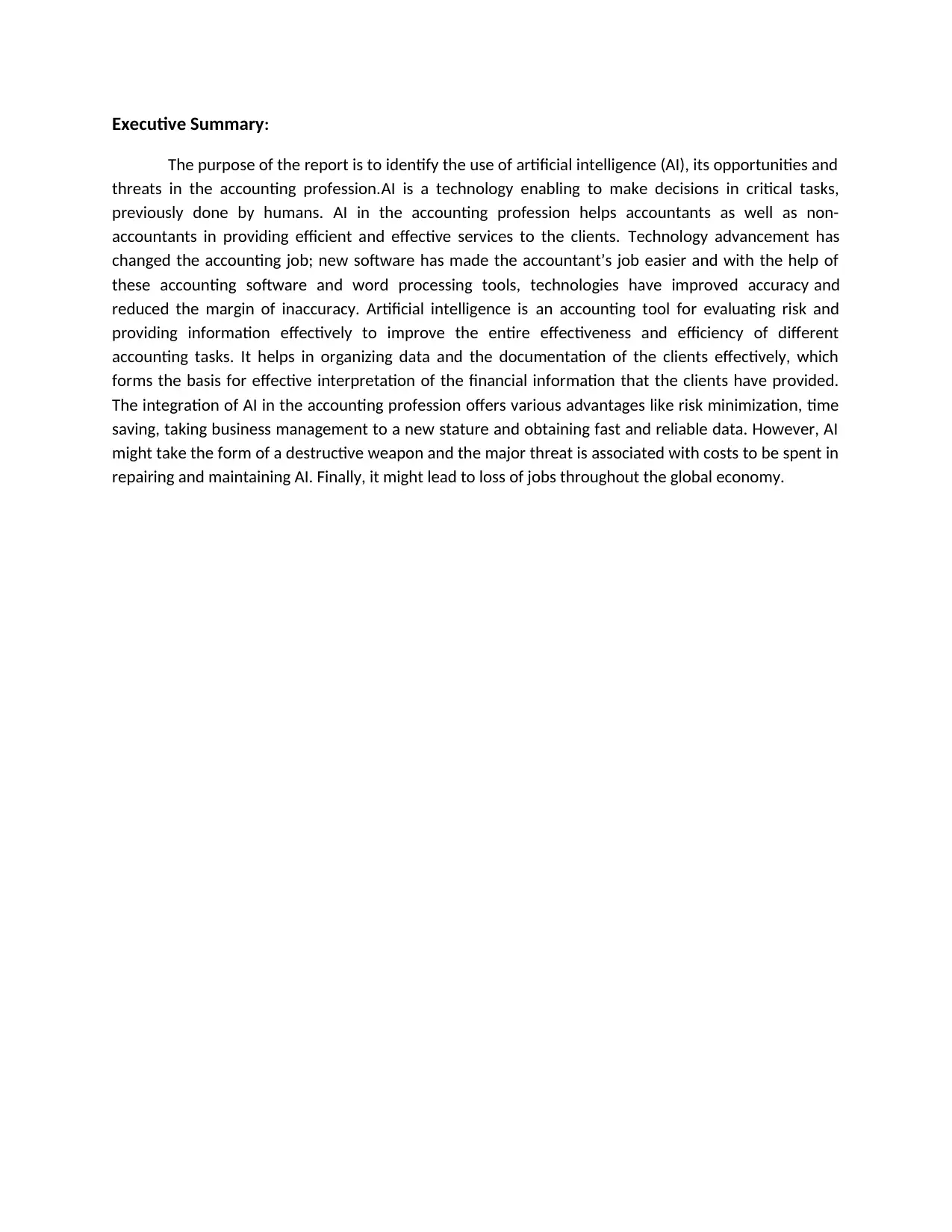
Executive Summary:
The purpose of the report is to identify the use of artificial intelligence (AI), its opportunities and
threats in the accounting profession.AI is a technology enabling to make decisions in critical tasks,
previously done by humans. AI in the accounting profession helps accountants as well as non-
accountants in providing efficient and effective services to the clients. Technology advancement has
changed the accounting job; new software has made the accountant’s job easier and with the help of
these accounting software and word processing tools, technologies have improved accuracy and
reduced the margin of inaccuracy. Artificial intelligence is an accounting tool for evaluating risk and
providing information effectively to improve the entire effectiveness and efficiency of different
accounting tasks. It helps in organizing data and the documentation of the clients effectively, which
forms the basis for effective interpretation of the financial information that the clients have provided.
The integration of AI in the accounting profession offers various advantages like risk minimization, time
saving, taking business management to a new stature and obtaining fast and reliable data. However, AI
might take the form of a destructive weapon and the major threat is associated with costs to be spent in
repairing and maintaining AI. Finally, it might lead to loss of jobs throughout the global economy.
The purpose of the report is to identify the use of artificial intelligence (AI), its opportunities and
threats in the accounting profession.AI is a technology enabling to make decisions in critical tasks,
previously done by humans. AI in the accounting profession helps accountants as well as non-
accountants in providing efficient and effective services to the clients. Technology advancement has
changed the accounting job; new software has made the accountant’s job easier and with the help of
these accounting software and word processing tools, technologies have improved accuracy and
reduced the margin of inaccuracy. Artificial intelligence is an accounting tool for evaluating risk and
providing information effectively to improve the entire effectiveness and efficiency of different
accounting tasks. It helps in organizing data and the documentation of the clients effectively, which
forms the basis for effective interpretation of the financial information that the clients have provided.
The integration of AI in the accounting profession offers various advantages like risk minimization, time
saving, taking business management to a new stature and obtaining fast and reliable data. However, AI
might take the form of a destructive weapon and the major threat is associated with costs to be spent in
repairing and maintaining AI. Finally, it might lead to loss of jobs throughout the global economy.
Secure Best Marks with AI Grader
Need help grading? Try our AI Grader for instant feedback on your assignments.
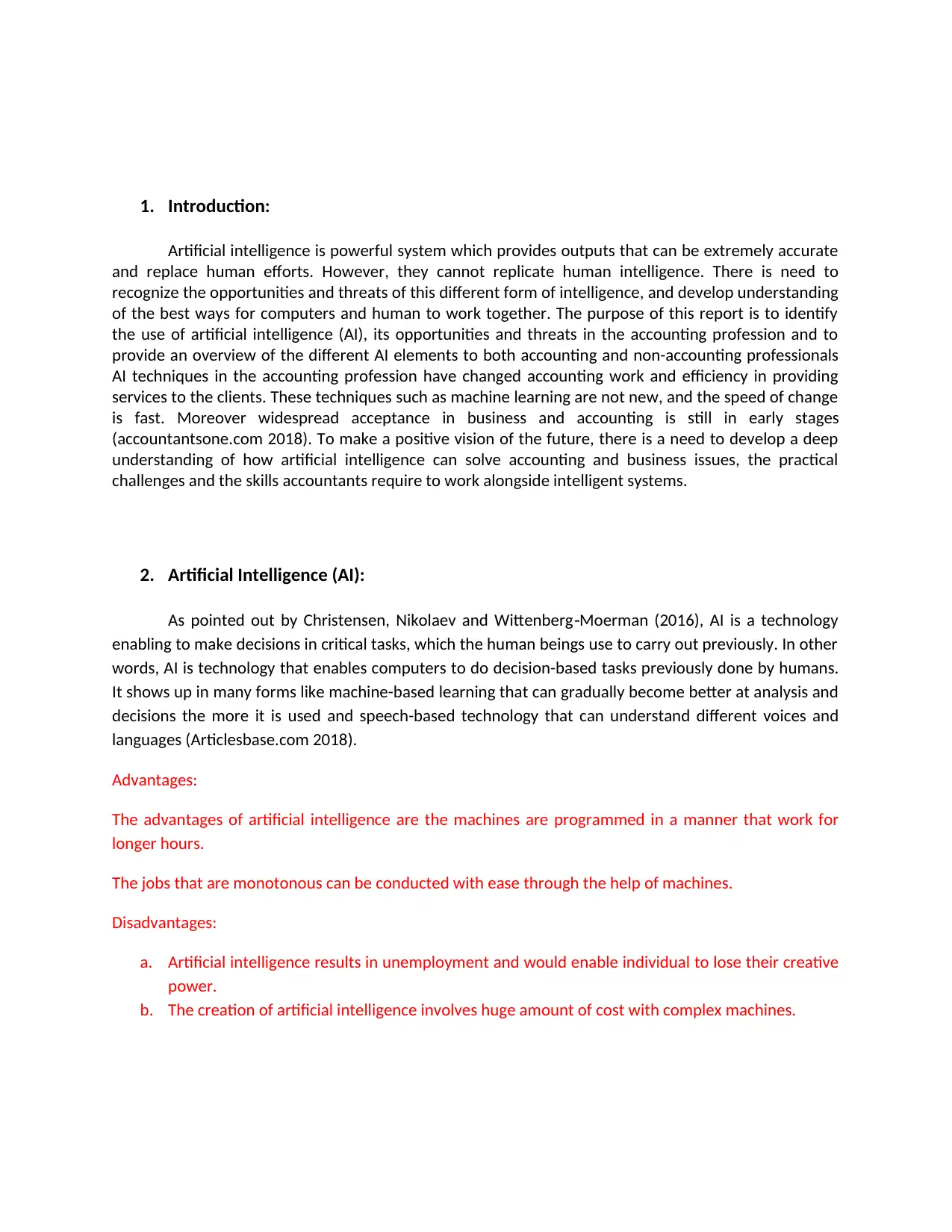
1. Introduction:
Artificial intelligence is powerful system which provides outputs that can be extremely accurate
and replace human efforts. However, they cannot replicate human intelligence. There is need to
recognize the opportunities and threats of this different form of intelligence, and develop understanding
of the best ways for computers and human to work together. The purpose of this report is to identify
the use of artificial intelligence (AI), its opportunities and threats in the accounting profession and to
provide an overview of the different AI elements to both accounting and non-accounting professionals
AI techniques in the accounting profession have changed accounting work and efficiency in providing
services to the clients. These techniques such as machine learning are not new, and the speed of change
is fast. Moreover widespread acceptance in business and accounting is still in early stages
(accountantsone.com 2018). To make a positive vision of the future, there is a need to develop a deep
understanding of how artificial intelligence can solve accounting and business issues, the practical
challenges and the skills accountants require to work alongside intelligent systems.
2. Artificial Intelligence (AI):
As pointed out by Christensen, Nikolaev and Wittenberg Moerman (2016), AI is a technology‐
enabling to make decisions in critical tasks, which the human beings use to carry out previously. In other
words, AI is technology that enables computers to do decision-based tasks previously done by humans.
It shows up in many forms like machine-based learning that can gradually become better at analysis and
decisions the more it is used and speech-based technology that can understand different voices and
languages (Articlesbase.com 2018).
Advantages:
The advantages of artificial intelligence are the machines are programmed in a manner that work for
longer hours.
The jobs that are monotonous can be conducted with ease through the help of machines.
Disadvantages:
a. Artificial intelligence results in unemployment and would enable individual to lose their creative
power.
b. The creation of artificial intelligence involves huge amount of cost with complex machines.
Artificial intelligence is powerful system which provides outputs that can be extremely accurate
and replace human efforts. However, they cannot replicate human intelligence. There is need to
recognize the opportunities and threats of this different form of intelligence, and develop understanding
of the best ways for computers and human to work together. The purpose of this report is to identify
the use of artificial intelligence (AI), its opportunities and threats in the accounting profession and to
provide an overview of the different AI elements to both accounting and non-accounting professionals
AI techniques in the accounting profession have changed accounting work and efficiency in providing
services to the clients. These techniques such as machine learning are not new, and the speed of change
is fast. Moreover widespread acceptance in business and accounting is still in early stages
(accountantsone.com 2018). To make a positive vision of the future, there is a need to develop a deep
understanding of how artificial intelligence can solve accounting and business issues, the practical
challenges and the skills accountants require to work alongside intelligent systems.
2. Artificial Intelligence (AI):
As pointed out by Christensen, Nikolaev and Wittenberg Moerman (2016), AI is a technology‐
enabling to make decisions in critical tasks, which the human beings use to carry out previously. In other
words, AI is technology that enables computers to do decision-based tasks previously done by humans.
It shows up in many forms like machine-based learning that can gradually become better at analysis and
decisions the more it is used and speech-based technology that can understand different voices and
languages (Articlesbase.com 2018).
Advantages:
The advantages of artificial intelligence are the machines are programmed in a manner that work for
longer hours.
The jobs that are monotonous can be conducted with ease through the help of machines.
Disadvantages:
a. Artificial intelligence results in unemployment and would enable individual to lose their creative
power.
b. The creation of artificial intelligence involves huge amount of cost with complex machines.
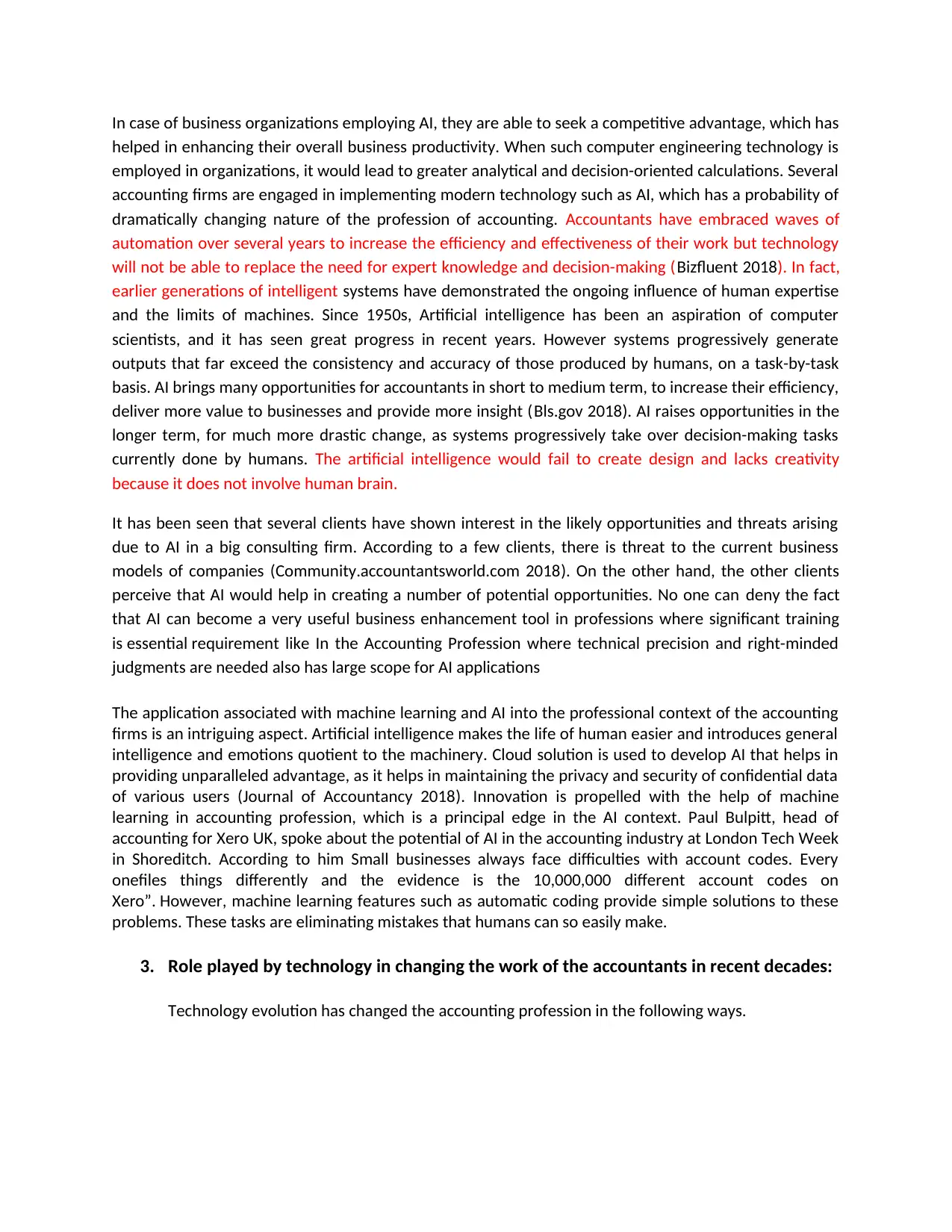
In case of business organizations employing AI, they are able to seek a competitive advantage, which has
helped in enhancing their overall business productivity. When such computer engineering technology is
employed in organizations, it would lead to greater analytical and decision-oriented calculations. Several
accounting firms are engaged in implementing modern technology such as AI, which has a probability of
dramatically changing nature of the profession of accounting. Accountants have embraced waves of
automation over several years to increase the efficiency and effectiveness of their work but technology
will not be able to replace the need for expert knowledge and decision-making (Bizfluent 2018). In fact,
earlier generations of intelligent systems have demonstrated the ongoing influence of human expertise
and the limits of machines. Since 1950s, Artificial intelligence has been an aspiration of computer
scientists, and it has seen great progress in recent years. However systems progressively generate
outputs that far exceed the consistency and accuracy of those produced by humans, on a task-by-task
basis. AI brings many opportunities for accountants in short to medium term, to increase their efficiency,
deliver more value to businesses and provide more insight (Bls.gov 2018). AI raises opportunities in the
longer term, for much more drastic change, as systems progressively take over decision-making tasks
currently done by humans. The artificial intelligence would fail to create design and lacks creativity
because it does not involve human brain.
It has been seen that several clients have shown interest in the likely opportunities and threats arising
due to AI in a big consulting firm. According to a few clients, there is threat to the current business
models of companies (Community.accountantsworld.com 2018). On the other hand, the other clients
perceive that AI would help in creating a number of potential opportunities. No one can deny the fact
that AI can become a very useful business enhancement tool in professions where significant training
is essential requirement like In the Accounting Profession where technical precision and right-minded
judgments are needed also has large scope for AI applications
The application associated with machine learning and AI into the professional context of the accounting
firms is an intriguing aspect. Artificial intelligence makes the life of human easier and introduces general
intelligence and emotions quotient to the machinery. Cloud solution is used to develop AI that helps in
providing unparalleled advantage, as it helps in maintaining the privacy and security of confidential data
of various users (Journal of Accountancy 2018). Innovation is propelled with the help of machine
learning in accounting profession, which is a principal edge in the AI context. Paul Bulpitt, head of
accounting for Xero UK, spoke about the potential of AI in the accounting industry at London Tech Week
in Shoreditch. According to him Small businesses always face difficulties with account codes. Every
onefiles things differently and the evidence is the 10,000,000 different account codes on
Xero”. However, machine learning features such as automatic coding provide simple solutions to these
problems. These tasks are eliminating mistakes that humans can so easily make.
3. Role played by technology in changing the work of the accountants in recent decades:
Technology evolution has changed the accounting profession in the following ways.
helped in enhancing their overall business productivity. When such computer engineering technology is
employed in organizations, it would lead to greater analytical and decision-oriented calculations. Several
accounting firms are engaged in implementing modern technology such as AI, which has a probability of
dramatically changing nature of the profession of accounting. Accountants have embraced waves of
automation over several years to increase the efficiency and effectiveness of their work but technology
will not be able to replace the need for expert knowledge and decision-making (Bizfluent 2018). In fact,
earlier generations of intelligent systems have demonstrated the ongoing influence of human expertise
and the limits of machines. Since 1950s, Artificial intelligence has been an aspiration of computer
scientists, and it has seen great progress in recent years. However systems progressively generate
outputs that far exceed the consistency and accuracy of those produced by humans, on a task-by-task
basis. AI brings many opportunities for accountants in short to medium term, to increase their efficiency,
deliver more value to businesses and provide more insight (Bls.gov 2018). AI raises opportunities in the
longer term, for much more drastic change, as systems progressively take over decision-making tasks
currently done by humans. The artificial intelligence would fail to create design and lacks creativity
because it does not involve human brain.
It has been seen that several clients have shown interest in the likely opportunities and threats arising
due to AI in a big consulting firm. According to a few clients, there is threat to the current business
models of companies (Community.accountantsworld.com 2018). On the other hand, the other clients
perceive that AI would help in creating a number of potential opportunities. No one can deny the fact
that AI can become a very useful business enhancement tool in professions where significant training
is essential requirement like In the Accounting Profession where technical precision and right-minded
judgments are needed also has large scope for AI applications
The application associated with machine learning and AI into the professional context of the accounting
firms is an intriguing aspect. Artificial intelligence makes the life of human easier and introduces general
intelligence and emotions quotient to the machinery. Cloud solution is used to develop AI that helps in
providing unparalleled advantage, as it helps in maintaining the privacy and security of confidential data
of various users (Journal of Accountancy 2018). Innovation is propelled with the help of machine
learning in accounting profession, which is a principal edge in the AI context. Paul Bulpitt, head of
accounting for Xero UK, spoke about the potential of AI in the accounting industry at London Tech Week
in Shoreditch. According to him Small businesses always face difficulties with account codes. Every
onefiles things differently and the evidence is the 10,000,000 different account codes on
Xero”. However, machine learning features such as automatic coding provide simple solutions to these
problems. These tasks are eliminating mistakes that humans can so easily make.
3. Role played by technology in changing the work of the accountants in recent decades:
Technology evolution has changed the accounting profession in the following ways.
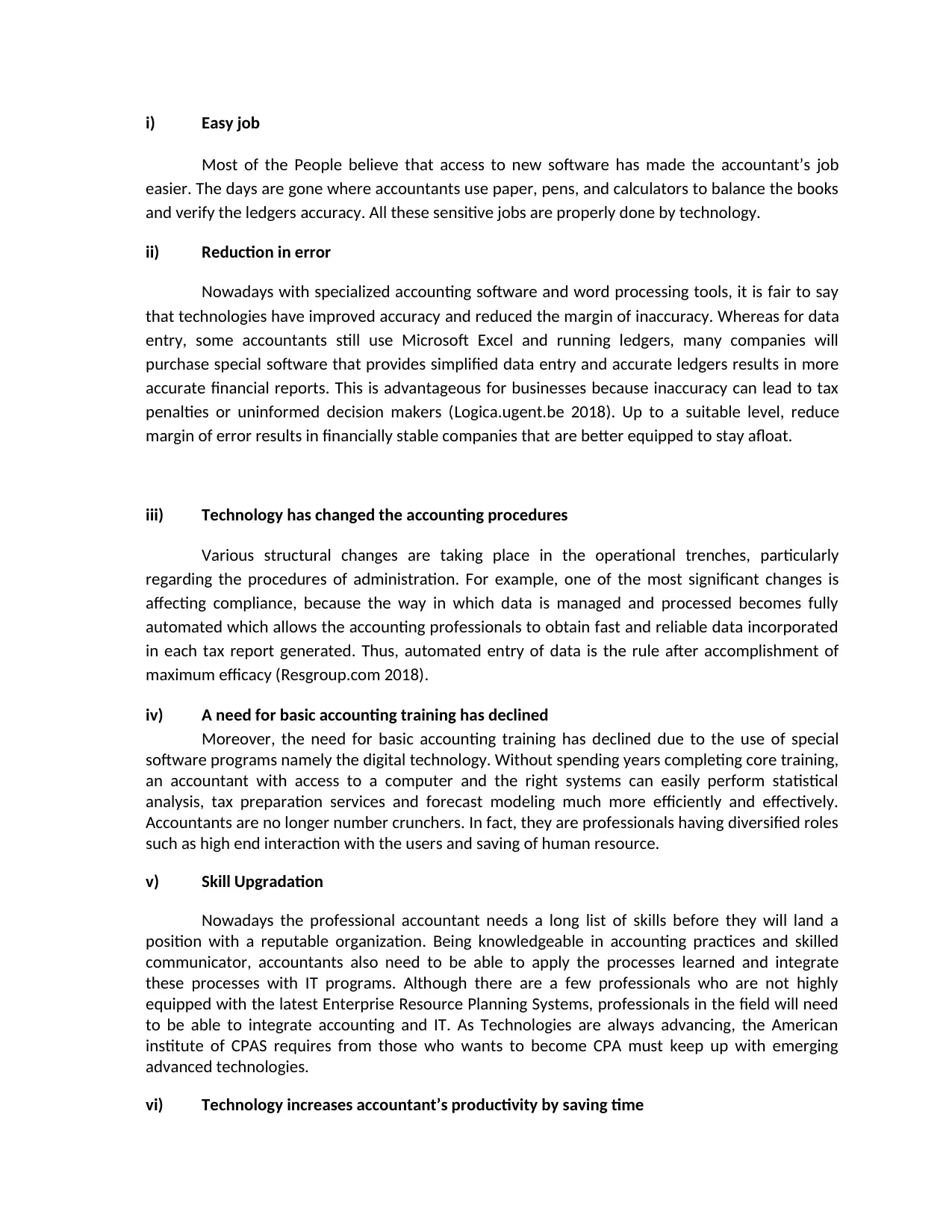
i) Easy job
Most of the People believe that access to new software has made the accountant’s job
easier. The days are gone where accountants use paper, pens, and calculators to balance the books
and verify the ledgers accuracy. All these sensitive jobs are properly done by technology.
ii) Reduction in error
Nowadays with specialized accounting software and word processing tools, it is fair to say
that technologies have improved accuracy and reduced the margin of inaccuracy. Whereas for data
entry, some accountants still use Microsoft Excel and running ledgers, many companies will
purchase special software that provides simplified data entry and accurate ledgers results in more
accurate financial reports. This is advantageous for businesses because inaccuracy can lead to tax
penalties or uninformed decision makers (Logica.ugent.be 2018). Up to a suitable level, reduce
margin of error results in financially stable companies that are better equipped to stay afloat.
iii) Technology has changed the accounting procedures
Various structural changes are taking place in the operational trenches, particularly
regarding the procedures of administration. For example, one of the most significant changes is
affecting compliance, because the way in which data is managed and processed becomes fully
automated which allows the accounting professionals to obtain fast and reliable data incorporated
in each tax report generated. Thus, automated entry of data is the rule after accomplishment of
maximum efficacy (Resgroup.com 2018).
iv) A need for basic accounting training has declined
Moreover, the need for basic accounting training has declined due to the use of special
software programs namely the digital technology. Without spending years completing core training,
an accountant with access to a computer and the right systems can easily perform statistical
analysis, tax preparation services and forecast modeling much more efficiently and effectively.
Accountants are no longer number crunchers. In fact, they are professionals having diversified roles
such as high end interaction with the users and saving of human resource.
v) Skill Upgradation
Nowadays the professional accountant needs a long list of skills before they will land a
position with a reputable organization. Being knowledgeable in accounting practices and skilled
communicator, accountants also need to be able to apply the processes learned and integrate
these processes with IT programs. Although there are a few professionals who are not highly
equipped with the latest Enterprise Resource Planning Systems, professionals in the field will need
to be able to integrate accounting and IT. As Technologies are always advancing, the American
institute of CPAS requires from those who wants to become CPA must keep up with emerging
advanced technologies.
vi) Technology increases accountant’s productivity by saving time
Most of the People believe that access to new software has made the accountant’s job
easier. The days are gone where accountants use paper, pens, and calculators to balance the books
and verify the ledgers accuracy. All these sensitive jobs are properly done by technology.
ii) Reduction in error
Nowadays with specialized accounting software and word processing tools, it is fair to say
that technologies have improved accuracy and reduced the margin of inaccuracy. Whereas for data
entry, some accountants still use Microsoft Excel and running ledgers, many companies will
purchase special software that provides simplified data entry and accurate ledgers results in more
accurate financial reports. This is advantageous for businesses because inaccuracy can lead to tax
penalties or uninformed decision makers (Logica.ugent.be 2018). Up to a suitable level, reduce
margin of error results in financially stable companies that are better equipped to stay afloat.
iii) Technology has changed the accounting procedures
Various structural changes are taking place in the operational trenches, particularly
regarding the procedures of administration. For example, one of the most significant changes is
affecting compliance, because the way in which data is managed and processed becomes fully
automated which allows the accounting professionals to obtain fast and reliable data incorporated
in each tax report generated. Thus, automated entry of data is the rule after accomplishment of
maximum efficacy (Resgroup.com 2018).
iv) A need for basic accounting training has declined
Moreover, the need for basic accounting training has declined due to the use of special
software programs namely the digital technology. Without spending years completing core training,
an accountant with access to a computer and the right systems can easily perform statistical
analysis, tax preparation services and forecast modeling much more efficiently and effectively.
Accountants are no longer number crunchers. In fact, they are professionals having diversified roles
such as high end interaction with the users and saving of human resource.
v) Skill Upgradation
Nowadays the professional accountant needs a long list of skills before they will land a
position with a reputable organization. Being knowledgeable in accounting practices and skilled
communicator, accountants also need to be able to apply the processes learned and integrate
these processes with IT programs. Although there are a few professionals who are not highly
equipped with the latest Enterprise Resource Planning Systems, professionals in the field will need
to be able to integrate accounting and IT. As Technologies are always advancing, the American
institute of CPAS requires from those who wants to become CPA must keep up with emerging
advanced technologies.
vi) Technology increases accountant’s productivity by saving time
Secure Best Marks with AI Grader
Need help grading? Try our AI Grader for instant feedback on your assignments.
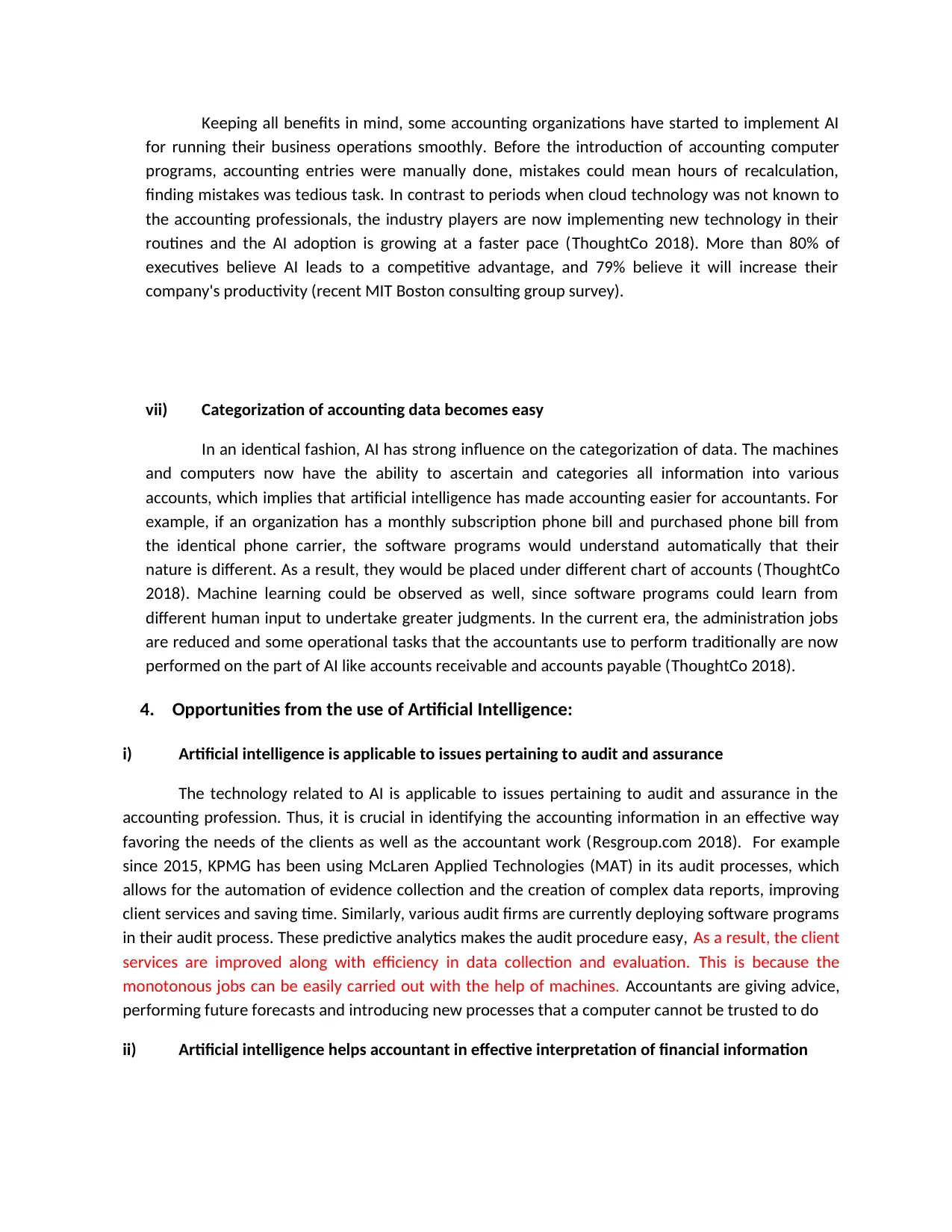
Keeping all benefits in mind, some accounting organizations have started to implement AI
for running their business operations smoothly. Before the introduction of accounting computer
programs, accounting entries were manually done, mistakes could mean hours of recalculation,
finding mistakes was tedious task. In contrast to periods when cloud technology was not known to
the accounting professionals, the industry players are now implementing new technology in their
routines and the AI adoption is growing at a faster pace (ThoughtCo 2018). More than 80% of
executives believe AI leads to a competitive advantage, and 79% believe it will increase their
company's productivity (recent MIT Boston consulting group survey).
vii) Categorization of accounting data becomes easy
In an identical fashion, AI has strong influence on the categorization of data. The machines
and computers now have the ability to ascertain and categories all information into various
accounts, which implies that artificial intelligence has made accounting easier for accountants. For
example, if an organization has a monthly subscription phone bill and purchased phone bill from
the identical phone carrier, the software programs would understand automatically that their
nature is different. As a result, they would be placed under different chart of accounts ( ThoughtCo
2018). Machine learning could be observed as well, since software programs could learn from
different human input to undertake greater judgments. In the current era, the administration jobs
are reduced and some operational tasks that the accountants use to perform traditionally are now
performed on the part of AI like accounts receivable and accounts payable (ThoughtCo 2018).
4. Opportunities from the use of Artificial Intelligence:
i) Artificial intelligence is applicable to issues pertaining to audit and assurance
The technology related to AI is applicable to issues pertaining to audit and assurance in the
accounting profession. Thus, it is crucial in identifying the accounting information in an effective way
favoring the needs of the clients as well as the accountant work (Resgroup.com 2018). For example
since 2015, KPMG has been using McLaren Applied Technologies (MAT) in its audit processes, which
allows for the automation of evidence collection and the creation of complex data reports, improving
client services and saving time. Similarly, various audit firms are currently deploying software programs
in their audit process. These predictive analytics makes the audit procedure easy, As a result, the client
services are improved along with efficiency in data collection and evaluation. This is because the
monotonous jobs can be easily carried out with the help of machines. Accountants are giving advice,
performing future forecasts and introducing new processes that a computer cannot be trusted to do
ii) Artificial intelligence helps accountant in effective interpretation of financial information
for running their business operations smoothly. Before the introduction of accounting computer
programs, accounting entries were manually done, mistakes could mean hours of recalculation,
finding mistakes was tedious task. In contrast to periods when cloud technology was not known to
the accounting professionals, the industry players are now implementing new technology in their
routines and the AI adoption is growing at a faster pace (ThoughtCo 2018). More than 80% of
executives believe AI leads to a competitive advantage, and 79% believe it will increase their
company's productivity (recent MIT Boston consulting group survey).
vii) Categorization of accounting data becomes easy
In an identical fashion, AI has strong influence on the categorization of data. The machines
and computers now have the ability to ascertain and categories all information into various
accounts, which implies that artificial intelligence has made accounting easier for accountants. For
example, if an organization has a monthly subscription phone bill and purchased phone bill from
the identical phone carrier, the software programs would understand automatically that their
nature is different. As a result, they would be placed under different chart of accounts ( ThoughtCo
2018). Machine learning could be observed as well, since software programs could learn from
different human input to undertake greater judgments. In the current era, the administration jobs
are reduced and some operational tasks that the accountants use to perform traditionally are now
performed on the part of AI like accounts receivable and accounts payable (ThoughtCo 2018).
4. Opportunities from the use of Artificial Intelligence:
i) Artificial intelligence is applicable to issues pertaining to audit and assurance
The technology related to AI is applicable to issues pertaining to audit and assurance in the
accounting profession. Thus, it is crucial in identifying the accounting information in an effective way
favoring the needs of the clients as well as the accountant work (Resgroup.com 2018). For example
since 2015, KPMG has been using McLaren Applied Technologies (MAT) in its audit processes, which
allows for the automation of evidence collection and the creation of complex data reports, improving
client services and saving time. Similarly, various audit firms are currently deploying software programs
in their audit process. These predictive analytics makes the audit procedure easy, As a result, the client
services are improved along with efficiency in data collection and evaluation. This is because the
monotonous jobs can be easily carried out with the help of machines. Accountants are giving advice,
performing future forecasts and introducing new processes that a computer cannot be trusted to do
ii) Artificial intelligence helps accountant in effective interpretation of financial information
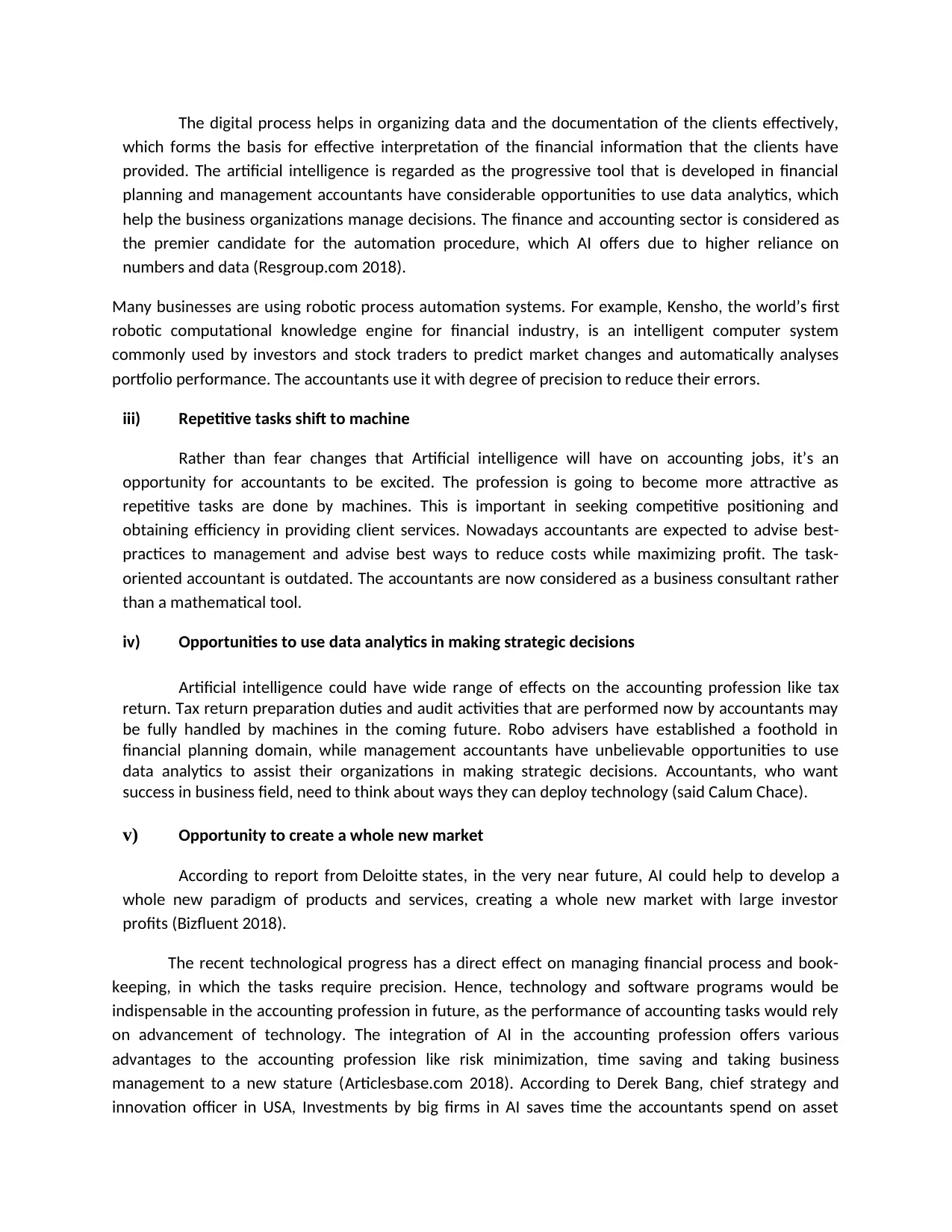
The digital process helps in organizing data and the documentation of the clients effectively,
which forms the basis for effective interpretation of the financial information that the clients have
provided. The artificial intelligence is regarded as the progressive tool that is developed in financial
planning and management accountants have considerable opportunities to use data analytics, which
help the business organizations manage decisions. The finance and accounting sector is considered as
the premier candidate for the automation procedure, which AI offers due to higher reliance on
numbers and data (Resgroup.com 2018).
Many businesses are using robotic process automation systems. For example, Kensho, the world’s first
robotic computational knowledge engine for financial industry, is an intelligent computer system
commonly used by investors and stock traders to predict market changes and automatically analyses
portfolio performance. The accountants use it with degree of precision to reduce their errors.
iii) Repetitive tasks shift to machine
Rather than fear changes that Artificial intelligence will have on accounting jobs, it’s an
opportunity for accountants to be excited. The profession is going to become more attractive as
repetitive tasks are done by machines. This is important in seeking competitive positioning and
obtaining efficiency in providing client services. Nowadays accountants are expected to advise best-
practices to management and advise best ways to reduce costs while maximizing profit. The task-
oriented accountant is outdated. The accountants are now considered as a business consultant rather
than a mathematical tool.
iv) Opportunities to use data analytics in making strategic decisions
Artificial intelligence could have wide range of effects on the accounting profession like tax
return. Tax return preparation duties and audit activities that are performed now by accountants may
be fully handled by machines in the coming future. Robo advisers have established a foothold in
financial planning domain, while management accountants have unbelievable opportunities to use
data analytics to assist their organizations in making strategic decisions. Accountants, who want
success in business field, need to think about ways they can deploy technology (said Calum Chace).
v) Opportunity to create a whole new market
According to report from Deloitte states, in the very near future, AI could help to develop a
whole new paradigm of products and services, creating a whole new market with large investor
profits (Bizfluent 2018).
The recent technological progress has a direct effect on managing financial process and book-
keeping, in which the tasks require precision. Hence, technology and software programs would be
indispensable in the accounting profession in future, as the performance of accounting tasks would rely
on advancement of technology. The integration of AI in the accounting profession offers various
advantages to the accounting profession like risk minimization, time saving and taking business
management to a new stature (Articlesbase.com 2018). According to Derek Bang, chief strategy and
innovation officer in USA, Investments by big firms in AI saves time the accountants spend on asset
which forms the basis for effective interpretation of the financial information that the clients have
provided. The artificial intelligence is regarded as the progressive tool that is developed in financial
planning and management accountants have considerable opportunities to use data analytics, which
help the business organizations manage decisions. The finance and accounting sector is considered as
the premier candidate for the automation procedure, which AI offers due to higher reliance on
numbers and data (Resgroup.com 2018).
Many businesses are using robotic process automation systems. For example, Kensho, the world’s first
robotic computational knowledge engine for financial industry, is an intelligent computer system
commonly used by investors and stock traders to predict market changes and automatically analyses
portfolio performance. The accountants use it with degree of precision to reduce their errors.
iii) Repetitive tasks shift to machine
Rather than fear changes that Artificial intelligence will have on accounting jobs, it’s an
opportunity for accountants to be excited. The profession is going to become more attractive as
repetitive tasks are done by machines. This is important in seeking competitive positioning and
obtaining efficiency in providing client services. Nowadays accountants are expected to advise best-
practices to management and advise best ways to reduce costs while maximizing profit. The task-
oriented accountant is outdated. The accountants are now considered as a business consultant rather
than a mathematical tool.
iv) Opportunities to use data analytics in making strategic decisions
Artificial intelligence could have wide range of effects on the accounting profession like tax
return. Tax return preparation duties and audit activities that are performed now by accountants may
be fully handled by machines in the coming future. Robo advisers have established a foothold in
financial planning domain, while management accountants have unbelievable opportunities to use
data analytics to assist their organizations in making strategic decisions. Accountants, who want
success in business field, need to think about ways they can deploy technology (said Calum Chace).
v) Opportunity to create a whole new market
According to report from Deloitte states, in the very near future, AI could help to develop a
whole new paradigm of products and services, creating a whole new market with large investor
profits (Bizfluent 2018).
The recent technological progress has a direct effect on managing financial process and book-
keeping, in which the tasks require precision. Hence, technology and software programs would be
indispensable in the accounting profession in future, as the performance of accounting tasks would rely
on advancement of technology. The integration of AI in the accounting profession offers various
advantages to the accounting profession like risk minimization, time saving and taking business
management to a new stature (Articlesbase.com 2018). According to Derek Bang, chief strategy and
innovation officer in USA, Investments by big firms in AI saves time the accountants spend on asset
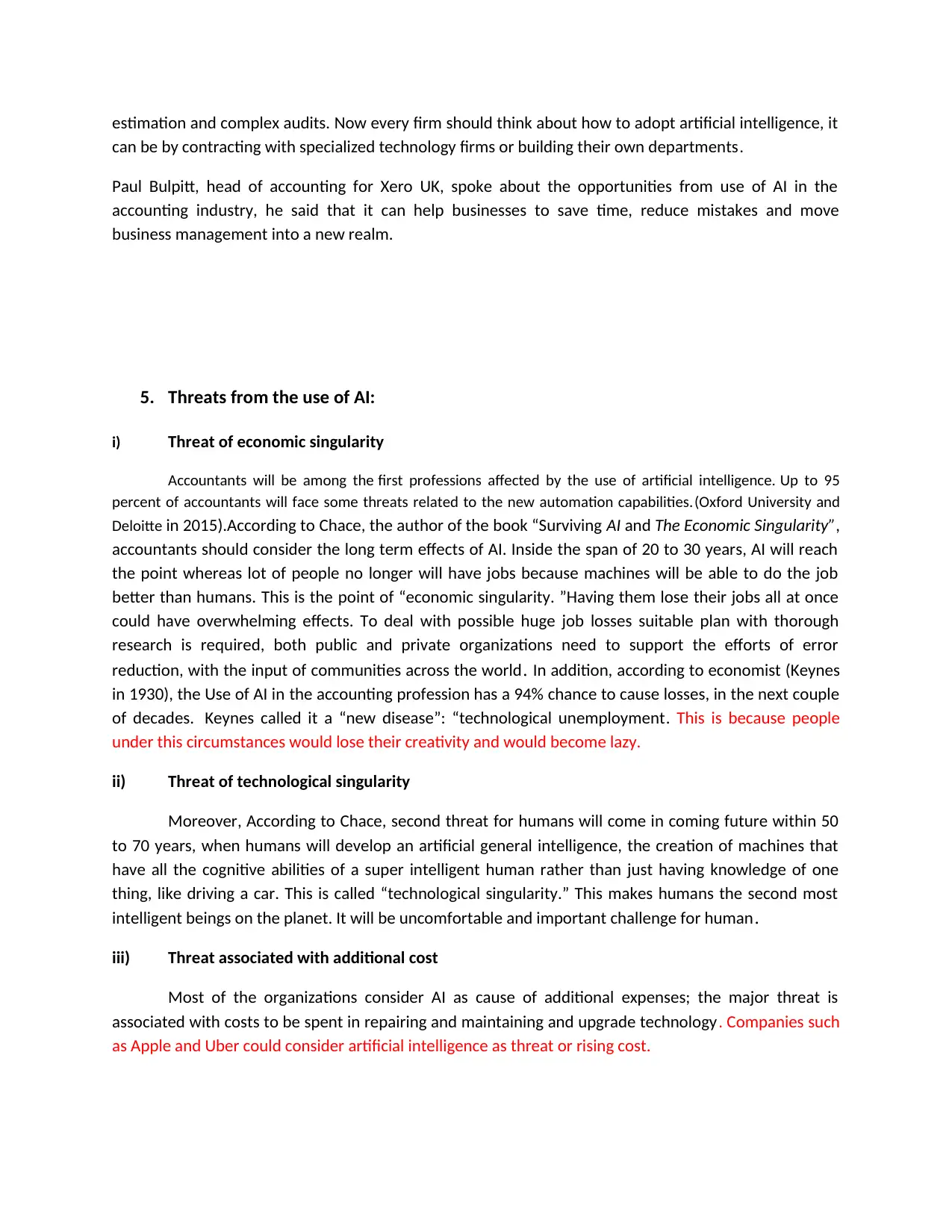
estimation and complex audits. Now every firm should think about how to adopt artificial intelligence, it
can be by contracting with specialized technology firms or building their own departments.
Paul Bulpitt, head of accounting for Xero UK, spoke about the opportunities from use of AI in the
accounting industry, he said that it can help businesses to save time, reduce mistakes and move
business management into a new realm.
5. Threats from the use of AI:
i) Threat of economic singularity
Accountants will be among the first professions affected by the use of artificial intelligence. Up to 95
percent of accountants will face some threats related to the new automation capabilities.(Oxford University and
Deloitte in 2015).According to Chace, the author of the book “Surviving AI and The Economic Singularity”,
accountants should consider the long term effects of AI. Inside the span of 20 to 30 years, AI will reach
the point whereas lot of people no longer will have jobs because machines will be able to do the job
better than humans. This is the point of “economic singularity. ”Having them lose their jobs all at once
could have overwhelming effects. To deal with possible huge job losses suitable plan with thorough
research is required, both public and private organizations need to support the efforts of error
reduction, with the input of communities across the world. In addition, according to economist (Keynes
in 1930), the Use of AI in the accounting profession has a 94% chance to cause losses, in the next couple
of decades. Keynes called it a “new disease”: “technological unemployment. This is because people
under this circumstances would lose their creativity and would become lazy.
ii) Threat of technological singularity
Moreover, According to Chace, second threat for humans will come in coming future within 50
to 70 years, when humans will develop an artificial general intelligence, the creation of machines that
have all the cognitive abilities of a super intelligent human rather than just having knowledge of one
thing, like driving a car. This is called “technological singularity.” This makes humans the second most
intelligent beings on the planet. It will be uncomfortable and important challenge for human.
iii) Threat associated with additional cost
Most of the organizations consider AI as cause of additional expenses; the major threat is
associated with costs to be spent in repairing and maintaining and upgrade technology. Companies such
as Apple and Uber could consider artificial intelligence as threat or rising cost.
can be by contracting with specialized technology firms or building their own departments.
Paul Bulpitt, head of accounting for Xero UK, spoke about the opportunities from use of AI in the
accounting industry, he said that it can help businesses to save time, reduce mistakes and move
business management into a new realm.
5. Threats from the use of AI:
i) Threat of economic singularity
Accountants will be among the first professions affected by the use of artificial intelligence. Up to 95
percent of accountants will face some threats related to the new automation capabilities.(Oxford University and
Deloitte in 2015).According to Chace, the author of the book “Surviving AI and The Economic Singularity”,
accountants should consider the long term effects of AI. Inside the span of 20 to 30 years, AI will reach
the point whereas lot of people no longer will have jobs because machines will be able to do the job
better than humans. This is the point of “economic singularity. ”Having them lose their jobs all at once
could have overwhelming effects. To deal with possible huge job losses suitable plan with thorough
research is required, both public and private organizations need to support the efforts of error
reduction, with the input of communities across the world. In addition, according to economist (Keynes
in 1930), the Use of AI in the accounting profession has a 94% chance to cause losses, in the next couple
of decades. Keynes called it a “new disease”: “technological unemployment. This is because people
under this circumstances would lose their creativity and would become lazy.
ii) Threat of technological singularity
Moreover, According to Chace, second threat for humans will come in coming future within 50
to 70 years, when humans will develop an artificial general intelligence, the creation of machines that
have all the cognitive abilities of a super intelligent human rather than just having knowledge of one
thing, like driving a car. This is called “technological singularity.” This makes humans the second most
intelligent beings on the planet. It will be uncomfortable and important challenge for human.
iii) Threat associated with additional cost
Most of the organizations consider AI as cause of additional expenses; the major threat is
associated with costs to be spent in repairing and maintaining and upgrade technology. Companies such
as Apple and Uber could consider artificial intelligence as threat or rising cost.
Paraphrase This Document
Need a fresh take? Get an instant paraphrase of this document with our AI Paraphraser
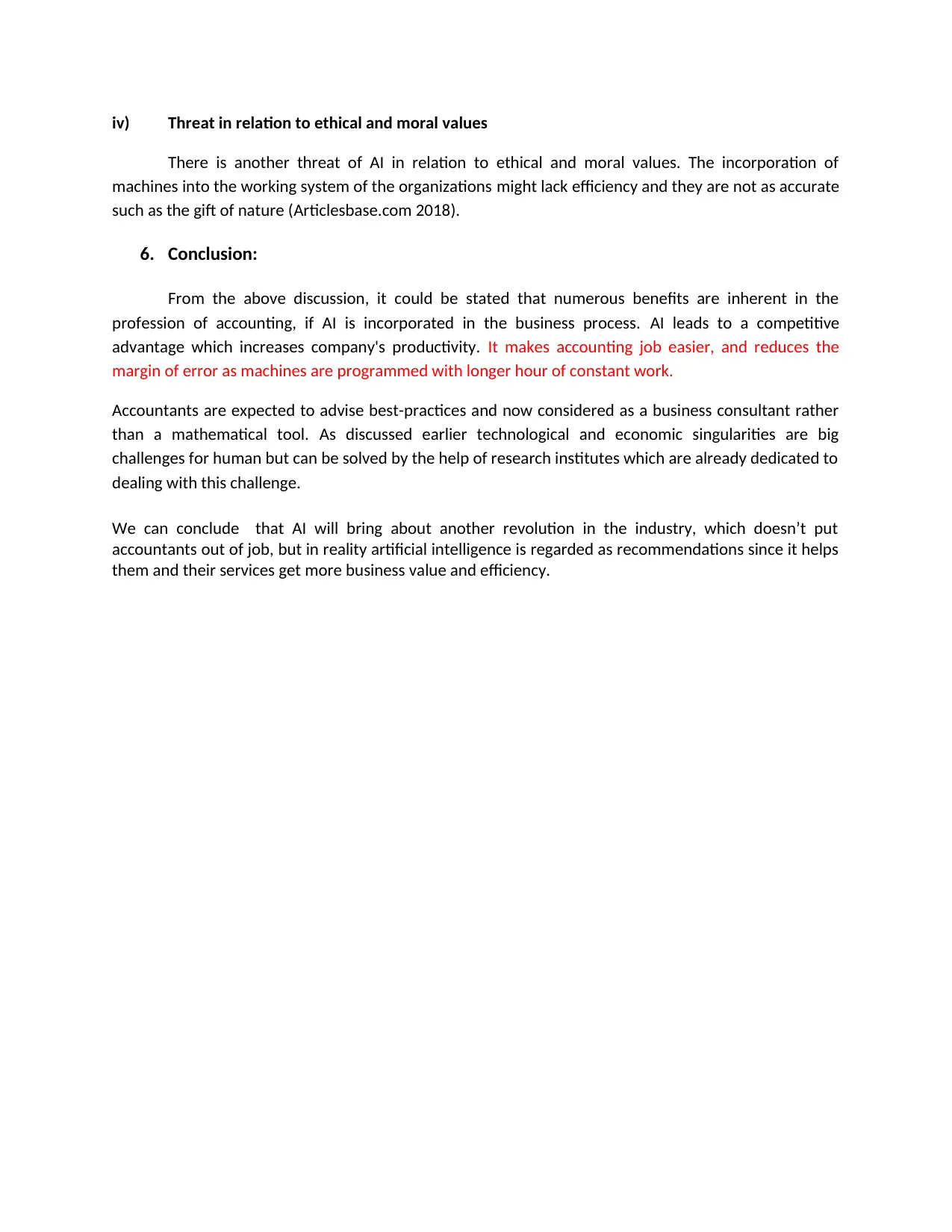
iv) Threat in relation to ethical and moral values
There is another threat of AI in relation to ethical and moral values. The incorporation of
machines into the working system of the organizations might lack efficiency and they are not as accurate
such as the gift of nature (Articlesbase.com 2018).
6. Conclusion:
From the above discussion, it could be stated that numerous benefits are inherent in the
profession of accounting, if AI is incorporated in the business process. AI leads to a competitive
advantage which increases company's productivity. It makes accounting job easier, and reduces the
margin of error as machines are programmed with longer hour of constant work.
Accountants are expected to advise best-practices and now considered as a business consultant rather
than a mathematical tool. As discussed earlier technological and economic singularities are big
challenges for human but can be solved by the help of research institutes which are already dedicated to
dealing with this challenge.
We can conclude that AI will bring about another revolution in the industry, which doesn’t put
accountants out of job, but in reality artificial intelligence is regarded as recommendations since it helps
them and their services get more business value and efficiency.
There is another threat of AI in relation to ethical and moral values. The incorporation of
machines into the working system of the organizations might lack efficiency and they are not as accurate
such as the gift of nature (Articlesbase.com 2018).
6. Conclusion:
From the above discussion, it could be stated that numerous benefits are inherent in the
profession of accounting, if AI is incorporated in the business process. AI leads to a competitive
advantage which increases company's productivity. It makes accounting job easier, and reduces the
margin of error as machines are programmed with longer hour of constant work.
Accountants are expected to advise best-practices and now considered as a business consultant rather
than a mathematical tool. As discussed earlier technological and economic singularities are big
challenges for human but can be solved by the help of research institutes which are already dedicated to
dealing with this challenge.
We can conclude that AI will bring about another revolution in the industry, which doesn’t put
accountants out of job, but in reality artificial intelligence is regarded as recommendations since it helps
them and their services get more business value and efficiency.
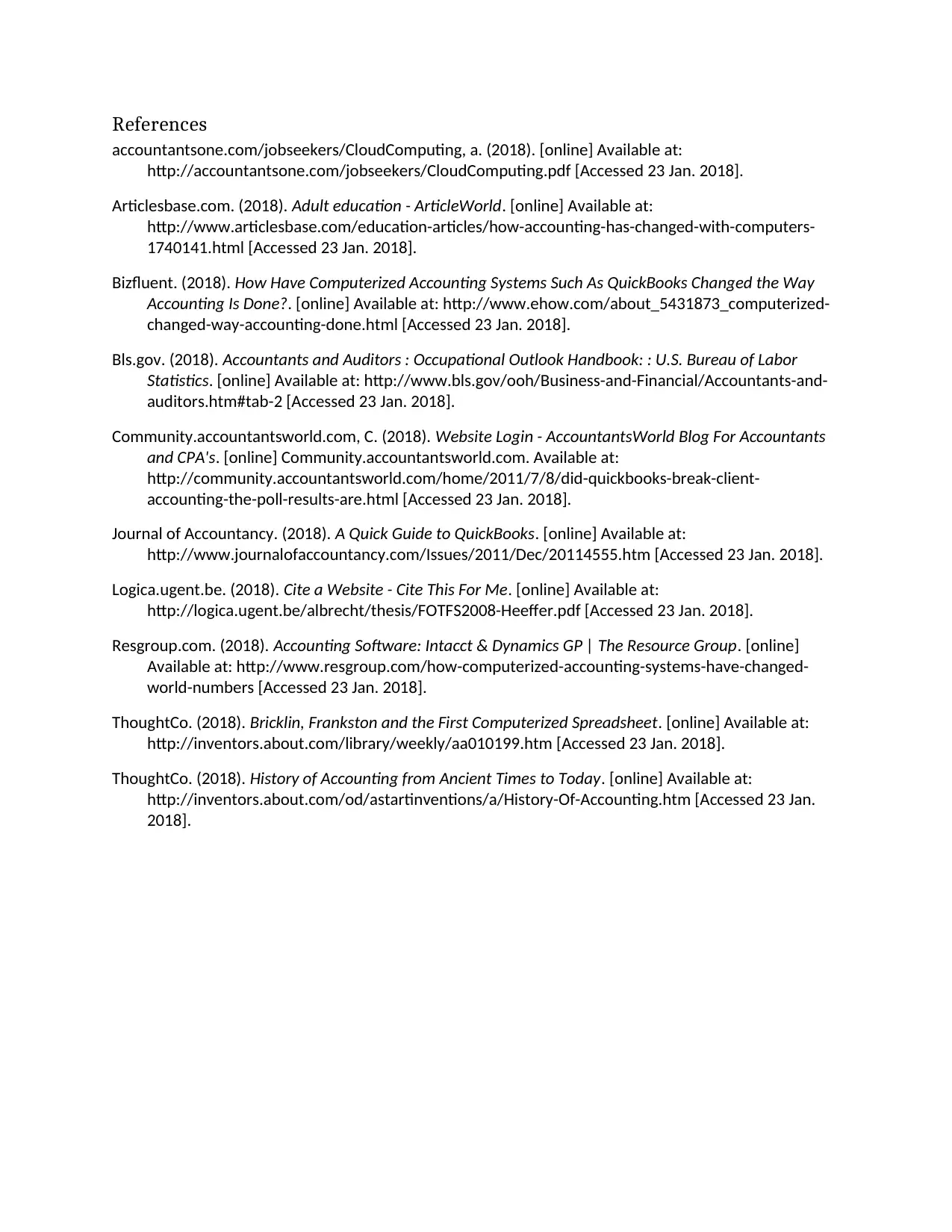
References
accountantsone.com/jobseekers/CloudComputing, a. (2018). [online] Available at:
http://accountantsone.com/jobseekers/CloudComputing.pdf [Accessed 23 Jan. 2018].
Articlesbase.com. (2018). Adult education - ArticleWorld. [online] Available at:
http://www.articlesbase.com/education-articles/how-accounting-has-changed-with-computers-
1740141.html [Accessed 23 Jan. 2018].
Bizfluent. (2018). How Have Computerized Accounting Systems Such As QuickBooks Changed the Way
Accounting Is Done?. [online] Available at: http://www.ehow.com/about_5431873_computerized-
changed-way-accounting-done.html [Accessed 23 Jan. 2018].
Bls.gov. (2018). Accountants and Auditors : Occupational Outlook Handbook: : U.S. Bureau of Labor
Statistics. [online] Available at: http://www.bls.gov/ooh/Business-and-Financial/Accountants-and-
auditors.htm#tab-2 [Accessed 23 Jan. 2018].
Community.accountantsworld.com, C. (2018). Website Login - AccountantsWorld Blog For Accountants
and CPA's. [online] Community.accountantsworld.com. Available at:
http://community.accountantsworld.com/home/2011/7/8/did-quickbooks-break-client-
accounting-the-poll-results-are.html [Accessed 23 Jan. 2018].
Journal of Accountancy. (2018). A Quick Guide to QuickBooks. [online] Available at:
http://www.journalofaccountancy.com/Issues/2011/Dec/20114555.htm [Accessed 23 Jan. 2018].
Logica.ugent.be. (2018). Cite a Website - Cite This For Me. [online] Available at:
http://logica.ugent.be/albrecht/thesis/FOTFS2008-Heeffer.pdf [Accessed 23 Jan. 2018].
Resgroup.com. (2018). Accounting Software: Intacct & Dynamics GP | The Resource Group. [online]
Available at: http://www.resgroup.com/how-computerized-accounting-systems-have-changed-
world-numbers [Accessed 23 Jan. 2018].
ThoughtCo. (2018). Bricklin, Frankston and the First Computerized Spreadsheet. [online] Available at:
http://inventors.about.com/library/weekly/aa010199.htm [Accessed 23 Jan. 2018].
ThoughtCo. (2018). History of Accounting from Ancient Times to Today. [online] Available at:
http://inventors.about.com/od/astartinventions/a/History-Of-Accounting.htm [Accessed 23 Jan.
2018].
accountantsone.com/jobseekers/CloudComputing, a. (2018). [online] Available at:
http://accountantsone.com/jobseekers/CloudComputing.pdf [Accessed 23 Jan. 2018].
Articlesbase.com. (2018). Adult education - ArticleWorld. [online] Available at:
http://www.articlesbase.com/education-articles/how-accounting-has-changed-with-computers-
1740141.html [Accessed 23 Jan. 2018].
Bizfluent. (2018). How Have Computerized Accounting Systems Such As QuickBooks Changed the Way
Accounting Is Done?. [online] Available at: http://www.ehow.com/about_5431873_computerized-
changed-way-accounting-done.html [Accessed 23 Jan. 2018].
Bls.gov. (2018). Accountants and Auditors : Occupational Outlook Handbook: : U.S. Bureau of Labor
Statistics. [online] Available at: http://www.bls.gov/ooh/Business-and-Financial/Accountants-and-
auditors.htm#tab-2 [Accessed 23 Jan. 2018].
Community.accountantsworld.com, C. (2018). Website Login - AccountantsWorld Blog For Accountants
and CPA's. [online] Community.accountantsworld.com. Available at:
http://community.accountantsworld.com/home/2011/7/8/did-quickbooks-break-client-
accounting-the-poll-results-are.html [Accessed 23 Jan. 2018].
Journal of Accountancy. (2018). A Quick Guide to QuickBooks. [online] Available at:
http://www.journalofaccountancy.com/Issues/2011/Dec/20114555.htm [Accessed 23 Jan. 2018].
Logica.ugent.be. (2018). Cite a Website - Cite This For Me. [online] Available at:
http://logica.ugent.be/albrecht/thesis/FOTFS2008-Heeffer.pdf [Accessed 23 Jan. 2018].
Resgroup.com. (2018). Accounting Software: Intacct & Dynamics GP | The Resource Group. [online]
Available at: http://www.resgroup.com/how-computerized-accounting-systems-have-changed-
world-numbers [Accessed 23 Jan. 2018].
ThoughtCo. (2018). Bricklin, Frankston and the First Computerized Spreadsheet. [online] Available at:
http://inventors.about.com/library/weekly/aa010199.htm [Accessed 23 Jan. 2018].
ThoughtCo. (2018). History of Accounting from Ancient Times to Today. [online] Available at:
http://inventors.about.com/od/astartinventions/a/History-Of-Accounting.htm [Accessed 23 Jan.
2018].
1 out of 9
Related Documents
Your All-in-One AI-Powered Toolkit for Academic Success.
+13062052269
info@desklib.com
Available 24*7 on WhatsApp / Email
![[object Object]](/_next/static/media/star-bottom.7253800d.svg)
Unlock your academic potential
© 2024 | Zucol Services PVT LTD | All rights reserved.





